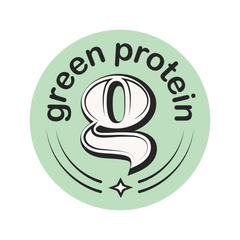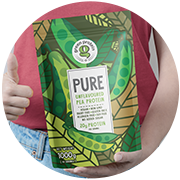
Whey Protein vs Plant Protein: What's the Difference & Which One is Better?
The ongoing debate in the health and fitness world between whey protein and plant protein is more than just a discussion about dietary choices; it's a conversation about optimizing health, fitness goals, and personal wellness. Both whey protein and plant protein have carved out significant roles in nutrition, catering to a diverse range of needs and preferences. This debate often centres on their distinct nutritional profiles and their impact on muscle development, weight management, and overall health. Understanding these differences is essential in choosing the right supplement for your individual health goals and dietary requirements.
This comprehensive guide aims to delve deep into the specifics of both whey protein and plant-based proteins. We will examine the benefits of whey protein powder & plant protein powder, explore the various types available in the market, and highlight the critical differences that set them apart. Our intention is to provide a clear, detailed difference between whey protein and plant protein, thereby assisting you in making an informed, health-conscious decision. We will also look at why isolated protein might be the answer. And a bonus - finding the best plant-based protein powder. Whether you're an athlete looking for optimal muscle recovery, someone on a weight management journey, or a health enthusiast exploring dietary supplements, understanding these key differences is crucial in tailoring your nutrition to your personal health and wellness journey.

What is Whey Protein Powder?
Whey protein powder, derived as a by-product of cheese production, is renowned for its superior quality, complete amino acid profile, and rapid absorption rate. This makes it highly sought after by athletes and fitness enthusiasts. Its major strength lies in its high leucine content, an essential amino acid pivotal for muscle synthesis. Whey protein is crucial in promoting muscle growth, aiding in repair, and enhancing overall health. Its efficiency in delivering amino acids to the muscles quickly makes it an invaluable resource in any athlete's dietary regimen.
Types of Whey Protein Powder
- Whey Protein Concentrate: This form contains a lower percentage of protein (typically around 70-80%) and higher levels of lactose and fats. It is less processed than other forms, making it a more natural choice for those who do not have lactose intolerance or dietary fat restrictions.
- Whey Isolate Protein Powder: Isolate undergoes more processing to remove lactose and fat, resulting in a higher protein content (around 90% or more). This makes it an excellent option for those with lactose intolerance or for individuals who are watching their fat intake.
- Whey Protein Hydrolysate: This form is pre-digested, meaning that it has undergone partial hydrolysis - a process necessary for the body to absorb protein. This makes it the fastest absorbing form of whey protein available, often used in medical protein supplements, and ideal for post-workout recovery.
Benefits of Whey Protein Powder
Whey protein is celebrated for its extensive benefits, particularly its high leucine content, which plays a critical role in muscle protein synthesis. This makes it highly effective for promoting muscle growth and repair, crucial for athletes and fitness enthusiasts. Let’s explore the benefits of whey protein powder:
Muscle Growth and Repair: The rich amino acid profile of whey protein, especially its high concentration of BCAAs (Branched-Chain Amino Acids), aids in rapid muscle recovery and growth, making it an essential supplement post-workout.
Weight Management: Whey protein can enhance satiety, reducing the likelihood of overeating. This, coupled with its ability to boost metabolism, makes it an effective tool in weight management strategies.
Immune Support: Whey protein contains immunoglobulins, which are known to strengthen the immune system. This makes it not just a muscle-building supplement but also a booster for your overall health.
Each of these benefits highlights why whey protein is a popular choice among various dietary supplements. Its ability to support intense training regimens while also catering to overall health needs makes it a versatile and effective option for many.
Plant-based Protein Powder
Plant-based protein powders are a cornerstone in the nutrition world for those seeking non-animal protein sources. These powders are derived from a variety of plant sources, such as peas, rice, hemp, and soy, offering a versatile and inclusive option for individuals following vegan, vegetarian, or dairy-free diets. They are not just alternatives but also robust nutritional supplements that cater to various health needs. Plant-based proteins are particularly appealing due to their lower environmental impact and the ethical considerations associated with plant-based diets.
Types of Plant-based Protein Powders
- Pea Protein: Extracted from yellow peas, pea protein is celebrated for its high iron content and the presence of arginine, an amino acid that promotes heart health and blood flow. It's also known for its ability to aid muscle growth, making it a popular choice among athletes and fitness enthusiasts.
- Rice Protein: Derived from brown rice, rice protein is a gentle option for the digestive system and is hypoallergenic, making it ideal for individuals with sensitivities or allergies to common protein sources like dairy or soy. It provides a balanced amino acid profile and is often combined with other plant proteins to enhance its nutritional value.
- Hemp Protein: Sourced from hemp seeds, hemp protein is not only rich in protein but also boasts a high content of omega-3 and omega-6 fatty acids, which are vital for heart health. It's also a good source of fiber, which supports digestive health and can contribute to a feeling of fullness.
- Soy Protein: As a complete protein, soy protein contains all nine essential amino acids, making it a highly effective option for muscle repair and overall health. It is particularly beneficial for heart health, given its potential to improve cholesterol levels.
Plant Protein Powder Benefits
Plant-based protein powders are a powerhouse of nutrition, offering an array of health benefits:
High in Fiber: These proteins typically have a higher fiber content compared to animal-based proteins, aiding in better digestion and contributing to a feeling of satiety, which can be beneficial for weight management.
Lactose-Free: Being naturally free from lactose, plant-based proteins are an excellent option for those with lactose intolerance or sensitivities to dairy products.
Muscle Growth and Maintenance: Despite a common misconception, plant-based proteins can effectively support muscle growth and maintenance, similar to whey protein, especially when consumed in adequate amounts and combined with resistance training.
Heart Health: Many plant proteins, particularly soy protein, have been linked to heart health benefits, such as lowering cholesterol levels.
Nutrient-Rich: Apart from protein, these powders often contain other essential nutrients like vitamins, minerals, and antioxidants, contributing to overall health and well-being.
This is how plant-based protein powders offer a comprehensive nutritional profile, making them a valuable addition to various diets. Whether for ethical, health, or dietary reasons, these proteins provide a viable and beneficial alternative to traditional animal-based proteins.
Differences Between Whey And Plant-based Proteins
While both of these boast of high protein content, there are many foundational differences. Looking at these differences can help you make an informed choice while choosing which way to go, pun intended.
Digestibility and Absorption
Whey protein is renowned for its quick absorption into the bloodstream, making it an excellent choice for post-workout recovery. The rapid absorption allows for an efficient supply of amino acids to the muscles, which is crucial for muscle repair and growth. This feature makes whey protein particularly popular among athletes and bodybuilders.
Plant proteins, on the other hand, generally have a slower absorption rate. This can be beneficial for sustained protein supply throughout the day. Additionally, plant proteins are often easier to digest, causing less discomfort for those with sensitive digestive systems or conditions like irritable bowel syndrome (IBS).
Environmental Impact
The production of plant-based proteins typically has a lower environmental impact compared to animal-derived proteins like whey. This includes lower greenhouse gas emissions, less water usage, and reduced land use. Choosing plant-based proteins can be a more sustainable and environmentally friendly option.
The production of whey protein, being animal-derived, generally has a higher environmental footprint. This includes factors like higher water usage and greater greenhouse gas emissions associated with dairy farming.
Nutritional Value
Whey protein is known for its high concentration of amino acids per serving, especially branched-chain amino acids (BCAAs), which are essential for muscle building. It is a complete protein, meaning it contains all nine essential amino acids required by the human body.
Plant-based proteins can be rich in additional nutrients not typically found in animal proteins. These include dietary fiber, which aids in digestion, and antioxidants, which combat oxidative stress in the body. Some plant proteins may not contain all essential amino acids, so it's important to consume a variety of protein sources.
Usage in Dietary Plans
Whey protein is often preferred in dietary plans focused on high-intensity training and muscle building due to its rapid absorption and high amino acid content. It's beneficial for those looking to maximize muscle repair and growth following intense workouts.
Plant-based proteins are popular in plant-based diets and for individuals focusing on general health and wellness. They are also suitable for those with specific dietary preferences or restrictions, such as vegan or vegetarian diets.
Health Implications
Whey protein may not be suitable for everyone, particularly those who are lactose intolerant or have allergies to dairy products. Some people may also experience digestive discomfort when consuming whey protein.
Plant proteins are often hypoallergenic, making them a good choice for people with food allergies or intolerances. They are generally gentler on the stomach and can be a safer option for those with sensitivities.
In sum, choosing between whey and plant-based proteins depends on your personal health goals, dietary preferences, and environmental concerns. Whey protein is ideal for quick muscle recovery, while plant-based proteins offer a sustainable, allergy-friendly option. For those exploring plant-based proteins, Green Protein offers a range of high-quality products. Their selection caters to various health needs, providing a nutritious choice for anyone looking to enhance their diet. Visit Green Protein's website whey protein vs plant protein to explore their plant-based protein options and find the right fit for your lifestyle.
Frequently Asked Questions
Is whey or plant-based protein better?
The choice between whey and plant-based protein depends on individual dietary needs and preferences. Whey is known for fast absorption, while plant-based proteins offer a variety of nutrients and are ideal for those with dairy allergies or vegan diets.
Can I take whey protein and plant protein together?
Yes, you can combine whey and plant proteins. This can be an effective way to enjoy the benefits of both, such as fast absorption from whey and the fiber content from plant proteins.
Can we take plant-based protein powder daily?
Yes, it's safe to consume plant-based protein powder daily. It's a great way to supplement your protein intake, especially if you follow a vegan or vegetarian diet.
Is whey or plant protein better for weight loss?
Both whey and plant proteins can support weight loss. Whey protein may aid in appetite control and muscle building, while plant proteins often have higher fiber content, promoting fullness.
Can you build muscle with plant protein powder?
Yes, you can build muscle with plant protein powder. While it's essential to consume a variety of plant proteins to get all essential amino acids, they can effectively support muscle growth and repair.









